In his celebrated Dream Argument Descartes maintained that w
In his celebrated \"Dream Argument,\" Descartes maintained that we should not trust any test that purports to distinguish dreaming from waking states. For any test you can think of, Descartes argued, you can never know whether you actually performed the test (and so have in hand useful test results) or whether you merely dreamed that you performed it (and so do not have any test results -- the test never took place because you merely dreamed that you performed it!). Your assignment this week is to apply Descartes\' argumentation to the \"pinch test,\" according to which if you pinch yourself hard right now and feel a sharp stab of pain then you know that you are awake. Please be sure that your essay addresses the following: 1.What would what would Descartes conclude about the reliability of the pinch test? 2.Exactly why would he conclude this? 3.Do you agree with Descartes\' reasoning and conclusion? Why or why not?
Solution
There are two main arguments that can be said about the pinch test for dreaming:
The more dominant and more plausible view, I suspect, is (2). The thought presumably is this: In dreams, we don\'t have tactile sense experiences, or pain experiences, or we do have such experiences but they\'re different from waking tactile experiences in a way discernible to a dreamer.
In the past, philosophers John Locke and Thomas Hobbes have separately attempted to refute Descartes\'s account of the dream argument. Locke claimed that pain in dreams is not of the same intensity as pain in reality. Various scientific studies conducted in the late 20th century provided evidence against Locke\'s claim by concluding that pain in dreams can accurately mirror pain in waking life. Hobbes\'s refutation claimed that dreams are susceptible to absurdity while the waking life is not.
So, considering these points Descartes may also have concluded that the pinch test is reliable to some extent. But, now there is also another argument:
While people dream, they usually do not realize they are dreaming (if they do, it is called a lucid dream). This has led philosophers to wonder whether one could actually be dreaming constantly, instead of being in waking reality (or at least that one cannot be certain, at any given point in time, that one is not dreaming). This type of argument is well known as \"Zhuangzi dreamed he was a butterfly\" ( Zhungzhu mèng dié): One night, Zhuangzi (369 BC) dreamed that he was a carefree butterfly, flying happily. After he woke up, he wondered how he could determine whether he was Zhuangzi who had just finished dreaming he was a butterfly, or a butterfly who had just started dreaming he was Zhuangzi.
In my point of view, Descartes\' reasoning and conclusion should be positive for the reliability of the pinch test. Because I personally feel that dreams are lucid. I\'ve read a lot of dream reports on dreams, and indeed it\'s not unusual to remark on the absence of tactile and pain sensations in dreams. For example, someone might report dreaming of being stabbed in the stomach and seeing blood come out, but without feeling any pain.

 Homework Sourse
Homework Sourse